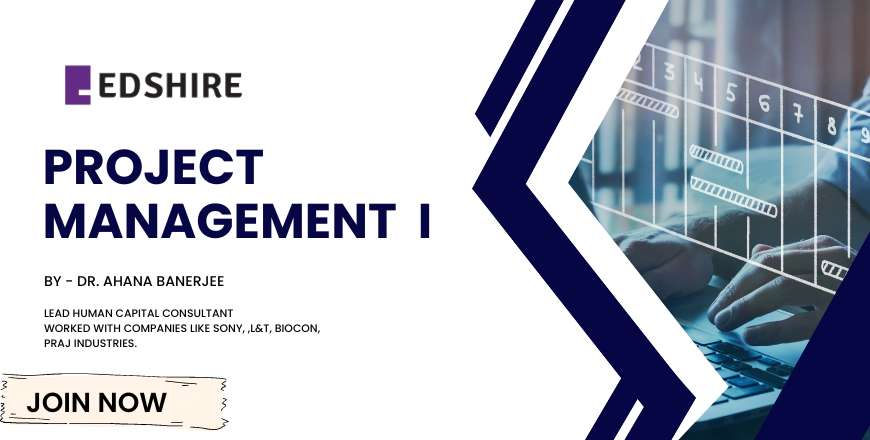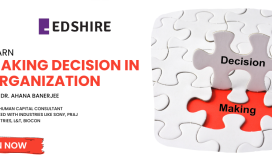Add to Wishlist
PROJECT MANAGEMENT I

Training Objective:
A very detailed study of what project management is and what are the various methodologies that is accepted in the Market to manage a Project. The Learning Objectives are given hereunder
- To understand the concept, characteristics and elements of Projects
- To understand the stages in Project Life Cycle
- To know the classification of Projects on various bases
- To appreciate the importance of Project Management
- To understand the importance of an integrated approach in Project Management
- To understand the concept of a Project Portfolio Management System
- To appreciate the need for Project Portfolio Management System
- To understand the design of the Project Portfolio Management System
- To understand the various Project Management structures
- To know the considerations in choosing the appropriate Project Management Structure
- To know about Project Management Office as a modern business practice
- To understand the steps in defining a project
- To understand the process of creating a work breakdown structure
- To know the pitfalls in creating WBS
- To understand the role of Project Rollup and Responsibility Matrices (RMs).
- To understand the external causes of project overruns
- To understand the internal constraints of project overruns
- To know about Opportunity Studies
- To know about Pre-Feasibility Studies
- To know about Functional or Support Studies
- To understand the components of Techno-Economic –Feasibility Studies
- To know about Detailed Project Report
- To know the various investment phases from project planning to project completion
- To understand the various stages in Project Life Cycle
- To learn about project constraints
- Course Content
The entire course is divided into 5 lessons and the following topics have been discussed
- Project Management – An Introduction – Concept of a Project – The Characteristics of a Project – The Basic Elements of a Project – Stages in Project Life Cycle – How do you classify Projects – Project Management – Importance of Project Management – An integrated approach to Project Management -Need for Project Portfolio Management System – Design for Project Portfolio Management System
- Project Portfolio Management System & Structure – Details about Project Portfolio Management – What are Project Management Structures – Choosing appropriate Project Management Structure – Steps in Defining the Project – Outline of Project Breakdown Structure –Outline of Project Roll Up
- Process Breakdown Structure – Role of Project Roll up in Identifying Project Cost & Schedule Problems – Responsibility Matrix – Description of Responsibility Matrix – Description of Responsibility Matrix – What is RACI – Developing a Responsibility Matrix – Project Overruns & External Causes of Delay – Internal Constraints
- Project Feasibility Studies – Discussion in Opportunity Studies – To know about Functional or Support Studies – Components of Project Feasibility Studies – To understand the components of Techno-Economic Feasibility Studies
- Pre – Investment Phases – To know the various investment phases from Project Planning to Completion – To understand the various stages in Project Life Cycle – To learn about Project Constraints
Target Audience
- Business Professionals, Project Managers, Project Leaders, Junior Management, Middle Management, Engineering/HR/Any Functional Management
- Students – Management, Engineering, General
- Anyone who wants to know more about Project Management and how to effectively manage Projects
Pedagogy:
- PowerPoint Presentation – Audio & Video
- Real-life Case Studies with Examples
- Language of Delivery: English
- Duration of Course: 14 hours
1
LESSON 1.1
2
LESSON 1.2
3
LESSON 1.3
4
LESSON 1.4
5
LESSON 1.5
6
LESSON 1.6
7
LESSON 1.7
8
LESSON 1.8
9
LESSON 1.9
10
LESSON 2.1
11
LESSON 2.2
12
LESSON 2.3
13
LESSON 2.4
14
LESSON 2.5
15
LESSON 2.6
16
LESSON 2.7
17
LESSON 2.8
18
LESSON 2.9
19
LESSON 2.10
20
LESSON 2.11
21
LESSON 2.12
22
LESSON 2.13
23
LESSON 2.14
24
LESSON 3.1
25
LESSON 3.2
26
LESSON 3.3
27
LESSON 3.4
28
LESSON 4.1
29
LESSON 4.2
30
LESSON 4.3
31
LESSON 4.4
32
LESSON 4.5
33
LESSON 4.6
34
LESSON 4.7
35
LESSON 4.8
36
LESSON 4.9
37
LESSON 4.10
38
LESSON 4.11
39
LESSON 4.12
40
LESSON 4.13
41
LESSON 4.14
42
LESSON 5.1
43
LESSON 5.2
44
LESSON 5.3
45
LESSON 5.4
46
LESSON 5.5
47
LESSON 5.6
48
LESSON 5.7
49
LESSON 5.8
50
LESSON 5.9
51
LESSON 5.10
52
LESSON 5.11
53
FINAL QUIZ
Project management is essentially the practice of turning ideas into reality. Learning how the pros plan, budget, prioritize, and execute projects will help you do the same in your personal and professional life. A goal without a plan can set you up for hours, weeks, or even months of busy work. However, if you approach your goals the same way a project manager would, you will be able to create actionable steps to achieving your goals while foreseeing challenges and prioritizing what really matters.
• Project – Classification
• Importance of Project Management An Integrated Approach
• Project Portfolio Management System
• Choosing the appropriate Project Management Structure
• Steps in defining the project
• Project Rollup
• Process breakdown structure
• Responsibility Matrices
• External causes of delay and internal constraints
• Project feasibility studies
• Opportunity studies
• General opportunity studies
• Components of project feasibility studies
• Managing Project resources flow
• Project planning to project completion:
• Pre-investment phase
• Investment Phase and operational phase
• Project Life Cycle
• Project constraints
The duration of the course is 14 hours
This course is advocated for those who are Business Professionals, Project Manager, Project Leaders, Junior Management, Middle Management, and Engineering/HR/Any Functional Management. It is also advisable for students – Management, Engineering, General. Anyone who wants to know more about Project Management and how to effectively manage Projects
There are no pre requisites as such, however a little bit of work experience may help
The videos have a power point presentation with slides running in the background and the trainer giving explanations and demonstrations. There are real life examples and case studies given by the trainer, which makes learning more interesting for the participants
There are assessments at the end of this course. There are Question & Answer formats and True or False Statements too, which will help you to understand how much you have learnt and progressed. Yes, after the completion of the course and assessments, the certificate of completion will be given
Be the first to add a review.
Please, login to leave a review




